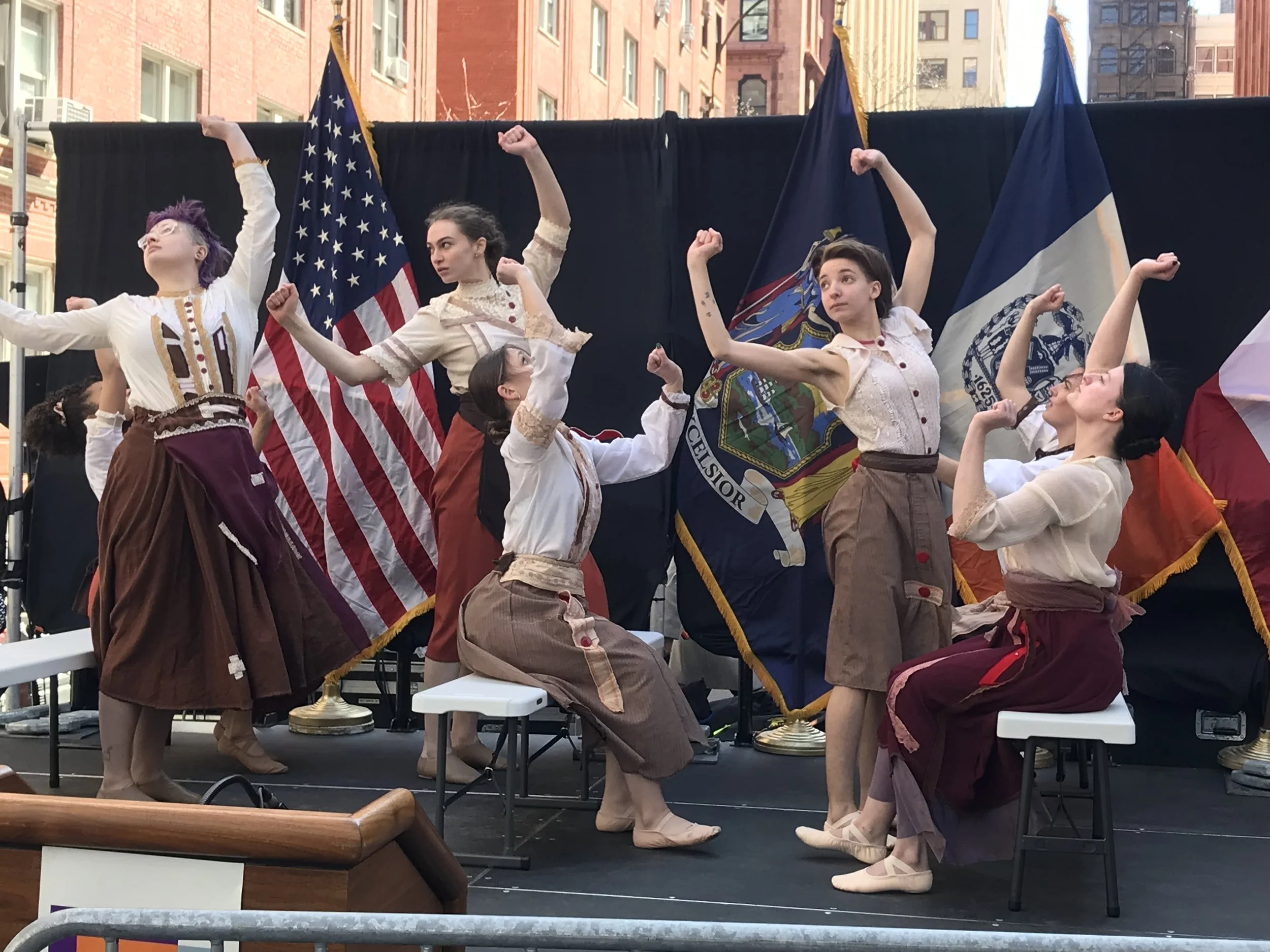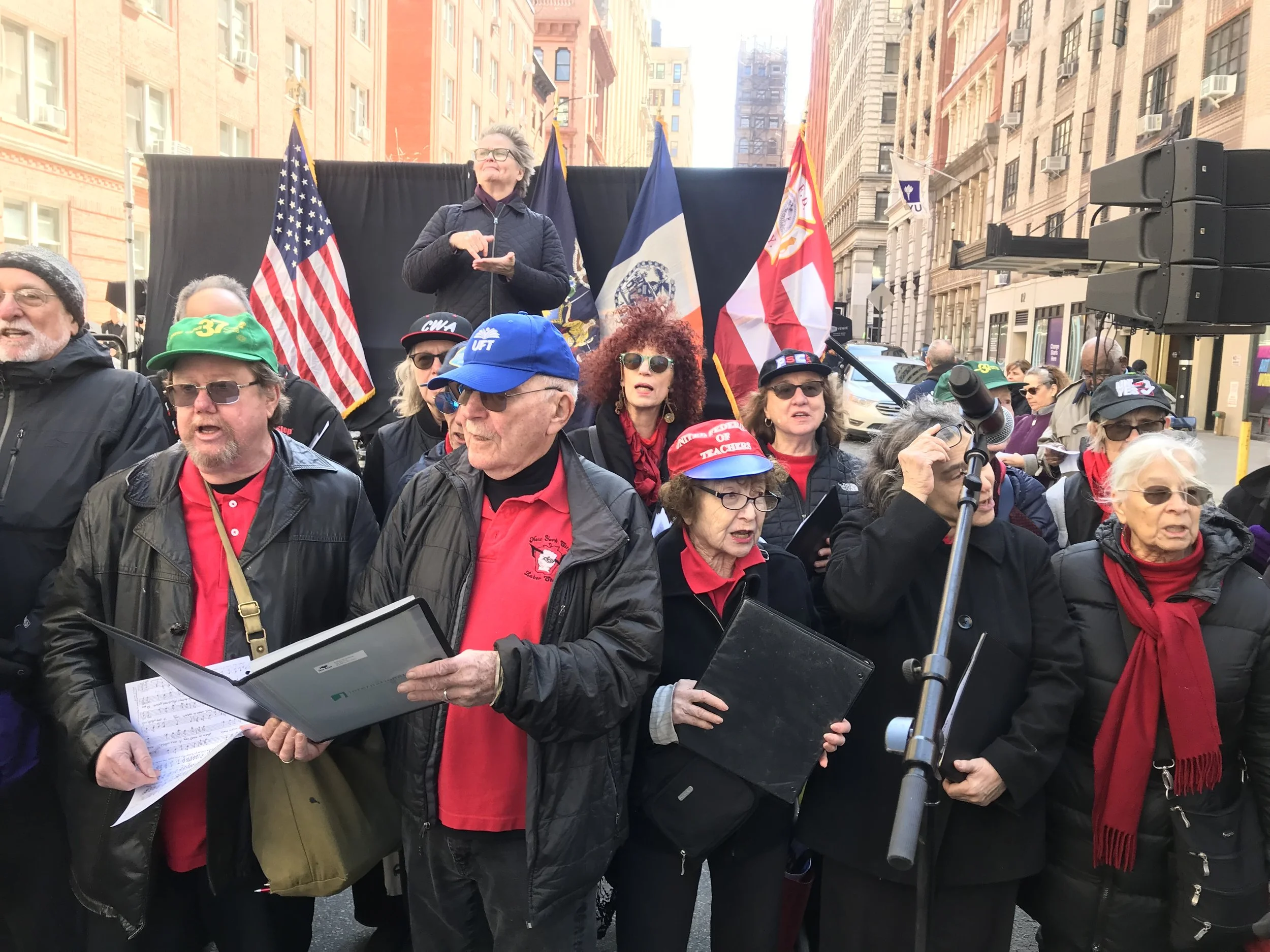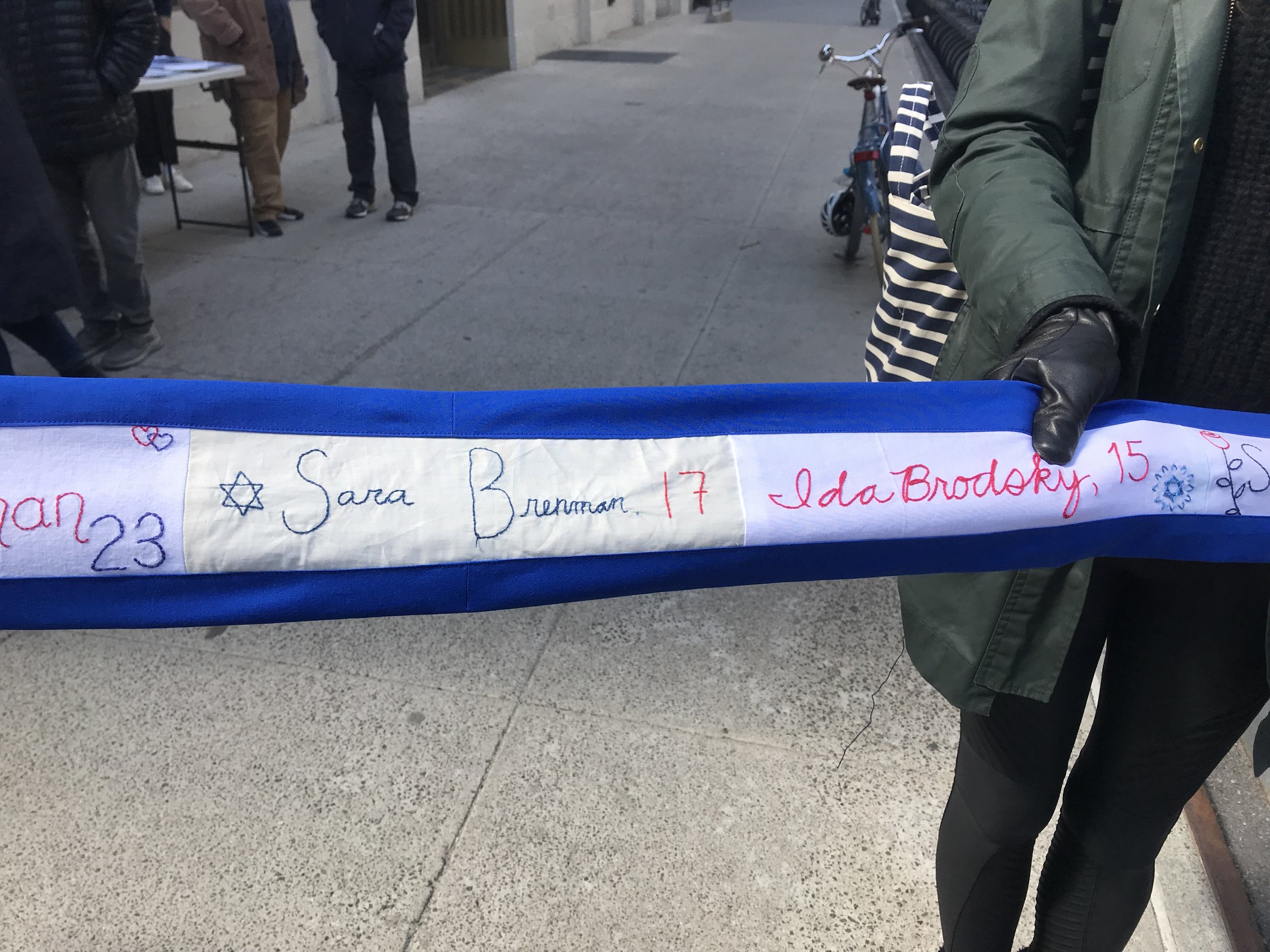The Triangle Factory Fire Dead are Speaking to the Trump Era
The University of Delaware dancers invoke the spirit of all those lost in the 1911 Triangle Shirtwaist Factory fire. Photos/Steve Wishnia
By Steve Wishnia
Last weekend, I read my 5-year-old granddaughter Brave Girl: Clara and the Shirtwaist Makers’ Strike of 1909, Michelle Markel’s children’s book about Clara Lemlich, the young woman who helped lead the “uprising of the 20,000”—the 1909-10 strike by women garment workers in New York.
The book had a picture of a building with a triangle logo on the side. “What shape is that?” I asked my granddaughter. “A triangle,” she answered.
“It’s a sign for the Triangle shirt company,” I told her. “Remember that. It’s important.”
“Why is it important to remember?” she asked me.
Why is it? To prevent similar tragedies, said several people at the March 25 memorial for the 1911 Triangle Shirtwaist fire, which killed 146 people at the factory near Washington Square. “Because these things keep repeating,” said retired school social worker Richard Zaslow, a white-bearded man wearing a blue United Federation of Teachers cap.
“So that everybody can see the importance of working with health and safety security,” said Eva Lopez, speaking in Spanish through a translator. “We’re here to honor the memories of the people who had this horrible tragedy.” Lopez is one of the 180 workers at Elanders Bergen, a luxury-clothing distribution warehouse in North Bergen, N.J., who are “battling to have a union,” the garment-workers union Workers United SEIU.
The NYC Labor Chorus sings “Union Maid” at this year’s Triangle Factory Fire Memorial.
Without having unions representing workers seeking safer conditions, “history would repeat itself,” said Workers United member Stanford Dempsey.
“Because it was a tragedy that didn’t have to happen. It was because of owner greed and the lack of respect for the people who worked for them,” said labor photographer Gary Schoichet. While it started the movement for worker safety, these things are still happening 114 years later, he added.
“To honor the people who jumped out the window,” said poet Esther Cohen, the retired head of 1199SEIU’s Bread and Roses cultural project. “And to link it to contemporary social-justice issues.
The ‘age of Trump’
In the “age of Trump,” Workers United secretary-treasurer Edgar Romney told Work-Bites, “the work that we’re doing is probably more important than ever. We have to continue to fight like we’ve never fought before to support workers’ rights. If we don’t, workers will be in deep trouble, and this country will be in deep trouble.”
“The Trump administration is trying to deregulate everything,” American Postal Workers Union President Jonathan Smith said. “We have to use the memory of this to keep from going back. We have a responsibility to be our brothers’ and sisters’ keepers.”
Trump issued a Jan. 20 executive order that indefinitely suspended consideration of heat-safety rules the Occupational Safety and Health Administration proposed last July. They would have been the first national heat standards ever, requiring employers to give workers water, shade, and rest breaks on hot days.
Banner bears the names of the 146 people—mostly young immigrant women and girls—who were killed in 1911’s Triangle Shirtwaist Factory fire.
His nominee to head OSHA, announced Mar. 13, is Amanda Wood Laihow, formerly director of labor and employment policy for the National Association of Manufacturers, with Michael Aspien, a former lobbyist for the antiunion law firm Littler Mendelson, as senior policy adviser. However, the agency has not taken action yet on a Project 2025 proposal to let teenagers work in “inherently dangerous jobs.”
Remembering the Triangle Fire “reminds us of how hard we had to work to get these standards met,” said Transport Workers Union safety director Celeste Kirkland. “Until somebody dies or is severely injured, nobody pays attention to safety.”
Garment manufacturing now happens largely in low-wage countries in south and southeast Asia. Nike spent $18 billion on a stock buyback in 2022, Global Labor Justice garment organizer Jeeva Muhil told the crowd, but it hasn’t paid workers in Cambodia, India, Indonesia, Pakistan, and Sri Lanka back wages its suppliers have owed since 2020. About 1,000 have gone public by signing a petition demanding raises and human-rights protections, she added.
In Sri Lanka, some garment workers make only $100 a month, a union leader there told Global Labor Justice.
The administration’s goal of cutting close to $880 billion from Medicaid over the next decade will deny “life-saving health care” to millions of people, said Diane Sosne, former president of SEIU Healthcare 1199NW.
“On March 25, 1911, it was corporate greed that caused deaths,” Sosne, whose grandmother survived the fire by crawling down several flights of stairs, told the crowd. “Today, on March 25, 2025, it is corporate greed that will cause many more deaths—and as a nurse, I know these deaths are preventable.”
‘L’dor v’dor’: From generation to generation
Brave Girl has an inspirational ending, but there’s more to the story that’s sad, I told my granddaughter: “There was a really bad fire” in the Triangle Shirtwaist factory.
In the crowd watching the fire was a 15-year-old boy named Morris Passoff—her great-great-grandfather, her great-grandmother’s father, and my grandfather. He’d only been in America for about a year, so he didn’t speak much English. He was a messenger for a newspaper, riding a horse to bring the reporter’s notes back to the office. He was really sad to see all the people killed. Most of them were girls his age or only a little older.
He later worked as a mailer, packing the newspapers into bundles when they came off the press.
My mother, now almost 94, likes to tell the story that when her father’s employer announced layoffs during the Depression, he and a few others from their union (International Typographers Union Local 6) got together at her family’s apartment in Brooklyn with a bottle of whiskey and some of my grandmother’s honey cake. They decided that instead of agreeing to layoffs, everyone would work part-time. It would hurt that they would all make less money, but none of them would be left with no money to buy food for their families.
“Honey cake is nice,” my granddaughter said. “And that sounds fair. Everybody got the same amount of money.”
One of the things that gives me hope for the future is that children, if they’re raised right, have an elemental sense of justice.



